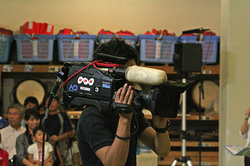Media Relations

With the increase of media scrutiny, a good story can turn bad in a heartbeat as there are numerous reporters out there, looking to have a laugh at your expense.
Remember you can always add the stipulation, that you want to see the article for approval prior to publication.
For print that works fine, but there are much more than just print media today, including the influx of so called reality shows which may try to slant something to a particular point of view.
Remember you can always add the stipulation, that you want to see the article for approval prior to publication.
For print that works fine, but there are much more than just print media today, including the influx of so called reality shows which may try to slant something to a particular point of view.

The following tips were compiled from the web, as well as some of my own tips, to provide you with you with some basic guidelines and things to remember when tangling with the media.
And remember two things, ALWAYS, first, nothing is off the record and second, reporters are not our friends, they have a job to do, and it is our job to find out what it is exactly.
And remember two things, ALWAYS, first, nothing is off the record and second, reporters are not our friends, they have a job to do, and it is our job to find out what it is exactly.
Gather basic details
Prepare for the interview
Speak with authority, clarity, energy
- Write down the reporter's name, media outlet, phone number and story deadline. If they try to rush you for an immediate interview or comment, politely ask them about the topic and offer to call them back and be conscious of their deadline.
- Do research on the reporter. See if they have written a similar article and how it was handled. See if they write down the line unbiased articles or sensational only, with a flair for cynicism.
- Ask what the story will be about and how the interview will be used. This is key to seeing if this is a genuine article versus one written for entertainment or parody.
- If TV or radio is calling, inquire about the interview format (live, taped, etc.).
Prepare for the interview
- Take a few minutes to write down the brief message(s) you want to convey.
- Avoid technical jargon, use lay terms. Remember to speak their language. Terms such as infrasound, tree knocking, are a lot better explained, by using predicates.
- Make sure your points are clear and succinct. Do not inflate claims or try to be cavalier.
- Be ready to support your message with a few examples and facts.
- Keep in mind what the public needs to know, and how the topic impacts people's lives. Understand confidentially of your witnesses and of your own family.
- Anticipate tough or sometimes nonsensical questions the reporter might ask.
- If you have any self doubt, practice delivering your message(s).
Speak with authority, clarity, energy
- Offer brief background on the subject at hand if the reporter seems to need it. Correct the misconceptions.
- Assume everything is on record, from the time you meet or talk with media until leaves / hangs up.
- There is no such thing as "off the record," just ask General Stanley McChrystal's staff.
- Speak with authority and energy, particularly for TV or radio interviews.
- State your position in positive terms, even if a reporter's questions turn negative or sound loaded. Faith is a positive argument among the negative.
- If the reporter's questions veer off track, politely steer interview back to your message(s). For example if they ask you, "do you believe in UFO's, ghosts?" etc, politely say that is not your topic of expertise, and it will not appear in the article. Even if you do or don't, it keeps the article on focus.
- If you're not sure the reporter understood your main points, ask him or her to repeat them. That avoid misquotes and misconceptions.

